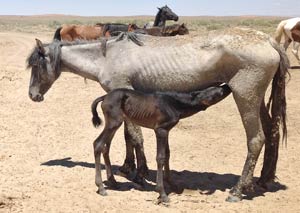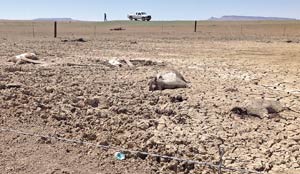Drought takes heavy toll on roaming horses
By Larissa L. Jimmy
Navajo Times
CHINLE, June 20, 2013


(Times photo – Larissa Jimmy)
A horse is found near Cottonwood, Ariz. with its face and lower body stuck in clay mud. Out of desperation, some horses have begun wading into deadly mud puddles to quench their thirst.
T he water hole at Lichii naazniil near Cottonwood, Ariz. has dried up.
A rotten smell of dead carcasses linger in the air. The rancid smell came from the 17 dead horses in various stages of decomposition around the crater of dried mud. A few of them had legs and arms buried beneath the clay as if they were emerging from the ground. One horse almost had its face completely submerged in the mud.
A decomposing filly lay outside the horrific scene, which is now barricaded off with barbed-wire fencing that was put up last week by the Cottonwood/Tselani Chapter; supplies were provided by the BIA office out of Chinle.
Near the north side of the fence is an unbranded female bay horse that had faltered and bloated. Both Eugene Tso, who works as a Chinle Chapter Grazing Official out of the BIA Division of Natural Resources, and Steven Tsosie, who works as a Cottonwood Chapter Grazing Official, say that they remember the bay horse wobbling around the week before.
The horses came to drink the water that collected in what Eugene calls a "water spreader" - a pool of storm-water that runs-off a hill and floods a large portion of land, typically used to irrigate a pasture.
Desperate for a drink, the animals waded in ... but they never got out. The bentonite clay of the Chinle Formation turns to deadly quicksand when a pool starts to dry. The horses discovered that too late.
It's not only the livestock that have suffered in this ongoing drought. The normally amiable communities of Chinle and Cottonwood have begun a conflict over water usage.
"People in Cottonwood take water from this area," said Sharon Yazzie, who waters her cattle at a windmill-filled tank near here.
Bitchinii is one of first of the three stops that Tso and Tsosie respond to. This windmill near Chinle has become overrun by livestock. According to a report from the Navajo Nation Department of Water Resources, the drought status for the month of May was "severe". The locals might say that's putting it mildly.
When two families pull up and begin separating their herd from the rest, they recognize both Tso and Tsosie and begin updating them about the people who have been taking water from their community windmill.
"They bring big jugs and big barrels," said Kimberly Billy, adding that two weeks ago there was a colt that was stomped to death by other horses trying to get to the water.
With the stored water slowly depleting due to the lack of precipitation, some livestock owners had taken it upon themselves to try to help the other livestock suffering from water deprivation.
Yazzie, who hauls her own water in her truck at least once a day for her cattle, says that she tries to give the livestock water as well, if there is any left over.
The windmills are not only running low on water, but many of the trough faucets are not working as well. The two grazing officials say that their department has been trying to bring this issue to the attention of the Water Department in Fort Defiance numerous times. Many of the broken-down windmills are fixable.
The people who utilize the windmill around the Alchiih Naa Ahyii took it upon themselves to fix the faucet head, which, according to Tso and Tsosie is the responsibility of the Water Department.
About eight miles east of the Salina Trading Post sits another windmill in Tse behniilzinii, overrun by 100-plus horses seeking water. Gathering in the distance are incoming cattle and more horses. Horses fought over the water trough, kicking and biting one another.
Not only did the violent behavior of the horses concern both Tso and Tsosie, but the condition that the horses were in - ribs sticking out, some staggering - called for immediate action.
A roundup was quickly organized. Dan Begay from the Department of Agriculture in Chinle provided panels that would hold the captured few until the resource enforcement ranger showed up.
As the propelling blades of the windmill swooshed like a pendulum, frail bodies stood alongside the tin walls lethargically trying to kick their way into the water tank.
"A lot of these horses usually run off when you come, but because they are thirsty and are malnutrition they don't have the energy to run off anymore," said Tso.
Around 65 horses were taken to the Navajo Nation Veterinary Center in Blackhat, N.M. Sgt. Aurelia Nez from the Department of Resource Enforcement said that once the horses were taken to the main headquarters in Blackhat, they would be given water.
Since the horses were not all rounded up, all contributing departments continued the task again the next day.
It was revealed after the horses were hauled off in three standard-size horse trailers that what they were fighting over was mud created by the drips of water from the faucet. Some bystanders eventually got the trough working again, but due to the low water levels the water pressure was little more than a drip.
Nez, who covers the Chinle area, says that once all the horses have been gathered they will each be processed. Those with no brands will be sold-off and those with brands will remain in their care until claimed.
Is there any relief in sight?
It all depends on what happens this month, said Robert Kirk, principal hydrologist with the Navajo Nation Department of Emergency Management. The coming monsoon season may bring some relief, but so far it doesn't look good.
Although only a half-inch of precipitation was recorded in the Chinle area in April, 2013 is not the driest year in recent memory. That honor would have to go 2004, when virtually no spring precipitation was recorded.
But dry years build on each other, Kirk said.
"We've been in a drought for eight years," he said.
According to climate data, it may not be just a drought. It may be the new normal.
If so, horses - and humans - will have to adjust.

